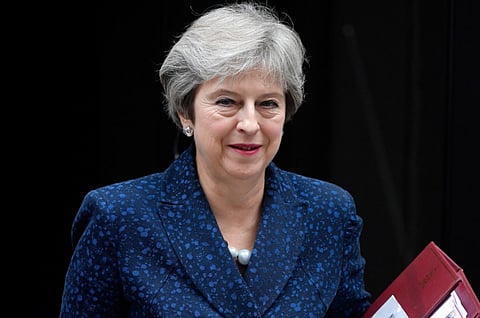Britain heading for a major political crisis
With Brexit looming, it is worth considering the worst-case scenario as the UK seems set to enter a chaotic era

With less than 199 days to go to the date set for Britain to leave the European Union — March 29, 2019 at 11pm — it is worth thinking about what will happen between now and then if everybody means what they say. For if they do, the United Kingdom could be headed for a major constitutional and political crisis, and it is best to be aware of that before further, and still more trenchant statements are made.
A very long list is developing of ideas that various participants are dead against. Steve Baker, Conservative MP and former minister, has said that at least 80 fellow Tory MPs are prepared to vote against a deal with the EU based on the Chequers proposals of Prime Minister Theresa May. Nick Boles, one of his colleagues, has said that a minimum of 40 Conservatives will, by contrast, vote against leaving the EU with no deal at all. The Labour Party is against any deal that doesn’t give us nearly all the advantages of staying in the EU, even though they accept we are meant to be leaving it. And Scottish Nationalists and Liberals are, of course, against any aspect of implementing Brexit at all. So what on earth — anyone trying to plan their business, or just worried about the country could be forgiven for asking — is going to happen?
First, let us assume that a deal is done. The EU realises May has no negotiating room left, moderates its stance, somehow agrees a compromise on the Irish border, and strikes a deal based on the Chequers proposals. There is now talk of a deal being done in November, which means that it might just happen in December. Under the European Union (Withdrawal) Act passed in June, any agreement can take effect only if approved by the House of Commons — and indeed a great deal of legislation including a whole new Act would need to be passed as well. Take the 80 MPs at their word that they will vote against it. That would mean it could be passed only if around 70 Labour MPs voted the other way and supported it.
The chances of such a large number of Labour MPs rescuing the government from an impending crisis, even with so much at stake for the country, is virtually zero. While a few of their bravest and most principled members have indeed voted with the government in close divisions in recent months, there are not many more who would risk being blamed for a Conservative ministry continuing in office. So the deal with the EU, painstakingly assembled, would be defeated.
It is possible that at this point the government could collapse, unable to agree on what to do next. But let us assume, as could happen, that it instead proposes to leave the EU with no deal, either because the only deal available has been defeated in this way or because no deal could be struck anyway. What then? The government is not only unable to pass a deal but even unable to pass laws and arrangements necessary to leave without a deal. Parliament is in favour of a new referendum and a delay but unable to pass the laws to facilitate what it wants without the cooperation of ministers. Complete with an atmosphere of intense recrimination and abuse, it would be no exaggeration to say that this would be the most serious constitutional crisis in Britain for at least one century, possibly two.
It would not be long before a case would be heard in the Supreme Court to decide on the interpretation of the Act, bringing the judiciary into a vast political decision. Some MPs would start appealing to Buckingham Palace to intervene, dragging in the monarchy as well.
The crisis could precipitate a general election, either through some Tories joining a motion of no-confidence or the prime minister deciding it was unavoidable. In that case, exit day would indeed have to be deferred, and the EU would agree to it in such circumstances since it would hope we would never leave. From such an election, anything could emerge — not only a Corbyn government or the long agony of another referendum, but quite possibly both. Or, on current polls, another hung parliament and the crisis still unresolved.
The outcome of such a sequence of events is unknowable, except that it would either be that we leave the EU accompanied by unremitting domestic chaos, or that we stay in it, despite the clear result of the vote in 2016. Either eventuality would cause grievous harm to the country, its international reputation, our economy and the standing of our politics. And before Brussels starts licking its lips over this, the uncertainty or sudden exit would cause massive problems for the Irish Republic and other countries, too.
Perhaps it is alarmist to describe such a scenario. But it is worth thinking about because everyone in parliament who is enjoying making categoric statements about being against Chequers or against “no deal” is now loading the revolver for a game of Russian roulette, with a lot more than Brexit at stake. With strong feelings aroused about what is in the national interest, that interest would be served best of all by some reflection on what could soon transpire, and on how to avert it.
— The Telegraph Group Limited, London, 2018
William Hague is the former UK foreign secretary and a former leader of the Conservative Party.



